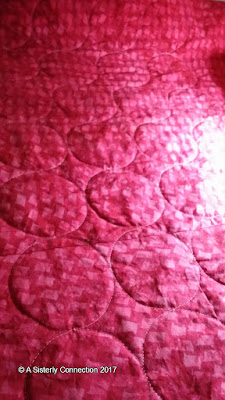When I was looking around the World Wide Web for baby stuff, I came across this
tutorial for a baby changing pad from
Homemade by Jill. Be sure to check it out! This post won't make much sense otherwise!
I made just a few changes. I didn't want pre-laminated fabric because I wanted to use my own fabric. I ordered the
laminate vinyl because it isn't available in the store.
I learned some things while using this product. Follow the package directions but keep these tips in mind:
- First, turn off any fans. Trust me. I have a ceiling fan in my sewing room where I was ironing. The reason I say turn off all fans is because I didn't think about
it.
Despite my best efforts, I laminated a piece of thread, dog hair, and
one of my hairs on my first try. ANYTHING on your fabric will be very
visible after laminating.
- Second, iron the fabric that you want to laminate very well.
- Third, go over the fabric with a lint roller repeatedly. If you shine the beam of a flashlight horizontally over your fabric instead of pointing it down to the fabric, fuzz, loose threads, hair etc will show better than it will by just eyeballing it.
- Fourth, when ironing the vinyl to the fabric, an iron with no steam holes is the ideal choice. I don't know about you but I learned a long time ago that, with fusibles, a steam iron can leave hole sized shapes of areas not fused.
According to the vinyl package directions, it should be wiped
cleaned. It can go in the washer but the vinyl might separate from the
fabric. If so, just iron it again, making sure to use a protective
paper between it and your iron or you'll have a big mess on your iron!
I followed her directions for cutting the laminated fabric (her step 1 and 2). Though on my third changing pad, (yes, third!) I didn't round the corners which made for easier binding.
Because the store was out of fusible fleece (her step 4), I used two layers of
quilt fleece instead.
Before cutting the non-laminated fabric to the size specified in the tutorial, I quilted the two layers of fleece to my non-laminated fabric in straight lines an inch apart. On my second changing pad, I found that if I cut the quilted fabric an 1/8th of an inch bigger than her instructions, it fit the laminated fabric better. Quilting makes it a little smaller. I sewed a small zigzag around the edge of the quilted fabric to squish the edges together for easier binding. (Small enough so it won't show after binding.)
I got a little confused when it got to the part about attaching the strap (her step 7). I blame my brain. :) Place the strap with the Velcro end
face down to your fabric. The non-Velcro end should be at the 9 inch mark. Stitch across the non-Velcro end to secure it to the pad. I stitched an X through it as well. This makes it flatter and even more secure. Be careful when sewing the stitching lines for folding the pad (her Step 10). I failed to make sure the strap was out of the way and sewed right over it. :(
Instead of store-bought bias tape (her step 12), I made my own binding just like I do for quilts, because I wanted to use my own fabric. And, cute little clips are so much easier than pins for the binding. These are available at many places,
Amazon included, and they come in different colors and package size.
Here's the one I made for my granddaughter. First picture is the pad folded. In the second picture, it is unfolded and the shiny part is the light reflecting off the vinyl. Third picture is one with square corners instead of rounded.
Slim and compact, I think this is perfect for when the baby is away from her own changing table.
LaDonna


















